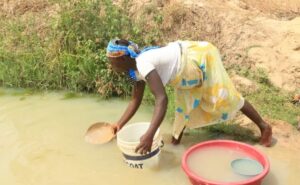
The United Nations Children’s Fund (UNICEF) fully embraced the groundbreaking move against Female Genital Mutilation, announcing it’s full support on Friday.
The law, carried out by Sudan’s transitional Government two weeks ago was passed by members of the Sovereign Council, following the ousting of former dictator, Omar Al-Bashir.
“This practice is not only a violation of every girl child’s rights, it is harmful and has serious consequences for a girl’s physical and mental health”, UNICEF representative in Sudan, Abdullah Fadil says.
Studies show that about 87% of Sudanese women aged 14-49 have undergone at least one form of Female Genital Mutilation, between the ages of 5-14.
The United Nations estimates that nearly 9 out of every 10 Sudanese women have been forced to undergo FGM Type III, which involves partial or total removal of external female genitalia.
Now, Sudan’s Government has introduced a game changer, stipulating a 3-year jail stint for anyone caught performing or aiding FGM. This comes under an amendment to Sudan’s Criminal Code approved on the 22nd of April.
Activist Nimco Ali of the Five Foundations, a global anti-FGM campaign organization, lauded the bravery of the new Government, saying:
“This is a massive step for Sudan and it’s new Government. Africa cannot prosper unless it takes care of girls and women. They are showing that this Government has teeth”.
Statistics have shown that FGM is practiced world wide, with Africa and the Middle East occupying front line positions.
A study by the Human Rights Body, Global Citizens, published on January 28, 2018 by James Hitchings Hale shows that the countries with the highest prevalence in Africa include:
.1. Somalia:
Population: 14.3 million
Prevalence: 98%
- Guinea
Population: 12.4 million
Prevalence: 97%
3.Djibouti
Population: 942,000
Prevalence: 93%
- Sierra Leone
Population: 7.4 million
Prevalence: 90%
- Mali
Population: 18 million
Prevalence: 89%
- Egypt
Population: 95.7 million
Prevalence: 87%
- Eritrea
Population: 4.5 million
Prevalence: 83%
- Sudan
Population: 39.6 million
Prevalence: 87%
FGM IN NIGERIA.
“Nigeria, due to its large population, has the highest absolute number of female genital mutilation (FGM) worldwide, accounting for about one-quarter of the estimated 115–130 million circumcised women in the world”.
This assertion was made by TC Okeke, USB Anyaehie, and CCK Ezenyeaku in their article
“An Overview of Female Genital Mutilation in Nigeria” published in Annals of Medical and Health Sciences Research.
A child abuse specialist, Maryam Enyiazu, says that Oyo, Osun, Ekiti, Ebonyi and Imo State topped the list of states with highest cases of female genital mutilation in the country.
Enyiazu is a specialist with United Nations International Children’s Fund.
According to her, genital mutilation or female circumcision was prevalent in the southern parts of the country than the northern part.
She said states in the South West accounted for 56.9 per cent of the cases, while the South East accounted for 40.8 per cent.
North Central, she stated, recorded 9.6 per cent of the cases, North East, 1.3 per cent; North West, 0.4 per cent; and South South, 34.7 per cent.
The expert added that Infibulations, which is the total removal of the clitoris and stitching of the vagina to allow small hole for urination, was the most common in Nasarawa State, with 22 per cent, Kaduna State has 21 per cent and Bayelsa State with 20 per cent.
Enyiazu disclosed the practice was higher among women whose mothers were circumcised, adding: “The higher the level of education of a woman, the less her daughter’s chance of being mutilated.”
WHAT IS FEMALE GENITAL MUTILATION?
Female genital mutilation refers to any procedure involving partial or total removal of the external female genitalia or other injury to the female genitals for non-medical reasons.
Basically, there are Four Types:
Type I, also called clitoridectomy, involves partial or total removal of the clitoris and/or prepuce.
Type II, also called excision, is the partial or total removal of the clitoris and the labia minora.
Type III, also called infibulation, is the narrowing of the vaginal orifice with a covering seal. The seal is formed by cutting and re-positioning the labia minora and/or the labia majora. Later in life, infibulated women may be cut open on the first night of marriage and/or before childbirth.
Type IV is any other harmful procedure to the female genitalia for non-medical purposes, such as pricking, piercing, incising, scraping or cauterization.
Types I and II are most prevalent, but variation exists within countries and communities. Type III – infibulation – is experienced by about 10 per cent of all affected women.
FGM AND HEALTH: WHAT YOU NEED TO KNOW.
FGM is so widely spread and has been given many excuses. Many who practice the act say it is a rite of passage, without which a girl would be unaccepted into the society. Some have even compared it to the removal of the male foreskin, but women who have experienced the practice testify contrariwise.
The WHO has listed the following as some of the major health issues accompanying Female Genital Mutilation, saying:
All forms of FGM are associated with increased health risk in the short- and long-term. FGM is a harmful practice and is unacceptable from a human rights as well as a public health perspective, regardless of who performs it. Some health care providers perform FGM (medicalization), but WHO is opposed to all forms of FGM and strongly urges health care providers to not carry out FGM even when their patient or their patient’s family requests it.
Short-term health risks of FGM
Severe pain. Cutting the nerve ends and sensitive genital tissue causes extreme pain. The healing period is also painful.
Excessive bleeding (haemorrhage). Can result if the clitoral artery or other blood vessel is cut.
Shock. Can be caused by pain, infection and/or haemorrhage.
Genital tissue swelling. Due to inflammatory response or local infection.
Infections. May spread after the use of contaminated instruments (e.g. use of same instruments in multiple genital mutilation operations), and during the healing period.
Urination problems. These may include urinary retention and pain passing urine. This may be due to tissue swelling, pain or injury to the urethra.
Impaired wound healing. Can lead to pain, infections and abnormal scarring.
Death. Death can result from infections, including tetanus, as well as haemorrhage that can lead to shock.
Mental health problems. The pain, shock and the use of physical force during the event, as well as a sense of betrayal when family members condone and/or organize the practice, are reasons why many women describe FGM as a traumatic event.
Long-term health risks of FGM (occurring at any time during life)
Pain. Due to tissue damage and scarring that may result in trapped or unprotected nerve endings.
Infections:
Chronic genital infections. With consequent chronic pain, and vaginal discharge and itching. Cysts, abscesses and genital ulcers may also appear.
Chronic reproductive tract infections. May cause chronic back and pelvic pain.
Urinary tract infections. If not treated, such infections can ascend to the kidneys, potentially resulting in renal failure, septicaemia and death. An increased risk of repeated urinary tract infections is well documented in both girls and adult women who have undergone FGM.
Painful urination. Due to obstruction of the urethra and recurrent urinary tract infections.
Vaginal problems. Discharge, itching, bacterial vaginosis and other infections.
Menstrual problems. Obstruction of the vaginal opening may lead to painful menstruation (dysmenorrhea), irregular menses and difficulty in passing menstrual blood, particularly among women with Type III FGM.
Excessive scar tissue (keloids). Excessive scar tissue can form at the site of the cutting.
Sexual health problems. FGM damages anatomic structures that are directly involved in female sexual function, and can therefore also have an effect on women’s sexual health and well-being. Removal of, or damage to, highly sensitive genital tissue, especially the clitoris, may affect sexual sensitivity and lead to sexual problems, such as decreased sexual desire and pleasure, pain during sex, difficulty during penetration, decreased lubrication during intercourse, and reduced frequency or absence of orgasm (anorgasmia). Scar formation, pain and traumatic memories associated with the procedure can also lead to such problems.
Childbirth complications (obstetric complications). FGM is associated with an increased risk of caesarean section, postpartum haemorrhage, recourse to episiotomy, difficult labour, obstetric tears/lacerations, instrumental delivery, prolonged labour, and extended maternal hospital stay. The risks increase with the severity of FGM.
Perinatal risks. Obstetric complications can result in a higher incidence of infant resuscitation at delivery and intrapartum stillbirth and neonatal death.
Mental health problems. Studies have shown that girls and women who have undergone FGM are more likely to experience post-traumatic stress disorder (PTSD), anxiety disorders, depression and somatic (physical) complaints (e.g. aches and pains) with no organic cause.
WHAT NEXT? EXPERTS ASK.
Several campaigners against FGM expressed doubt over dependence on the law alone, as Sudan amongst other African countries practicing the heinous act, is particularly resilient.
“This is not just about legal reforms”, Salma Ismail, a spokeswoman in Khartoum on behalf of the United Nations Children’s Fund said.
“There’s a lot of work to be done to ensure that society will accept this”.
Female Genital Mutilation is one of the practices that has taken root and mostly resisted change, despite a global outcry and numerous campaigns.
Cultural links and heavy superstitions weaved around the act can be blamed; a large amount of cultures who practice the act cite everything from sexual purity to fostering cultural acceptance as an excuse.
Campaigners against the act have however blamed gender inequality and control as the root cause.
You may be interested

2024 CHANQ: History Not Kind To Us Against Ghana –Ogunmodede
Webby - December 24, 2024Home-based Super Eagles coach Daniel Ogunmodede says history has not been good to Nigeria when they face rivals Ghana.The home-based…

Ex-Chelsea Star Oscar Returns To Boyhood Club Sao Paulo
Webby - December 24, 2024Former Chelsea midfielder Oscar is returning to his Brazilian boyhood club Sao Paulo after 14 years, which included a long…

‘I’m Incredibly Proud’– Arokodare Talks Up Genk’s Unbeaten Home Streak
Webby - December 23, 2024Tolu Arokodare is full of excitement followingGenk’s historic victory over Anderlecht, reports Completesports.com.Sunday’s win at the Cegeka Arena was the…






















![American Pastor, David Wilson Seen Eating The Box Of Woman Who Isn’t His Wife [Video]](https://onlinenigeria.com/wp-content/uploads/2019/10/american-pastor-david-wilson-seen-eating-the-box-of-woman-who-isnt-his-wife-video-150x150.jpg)








